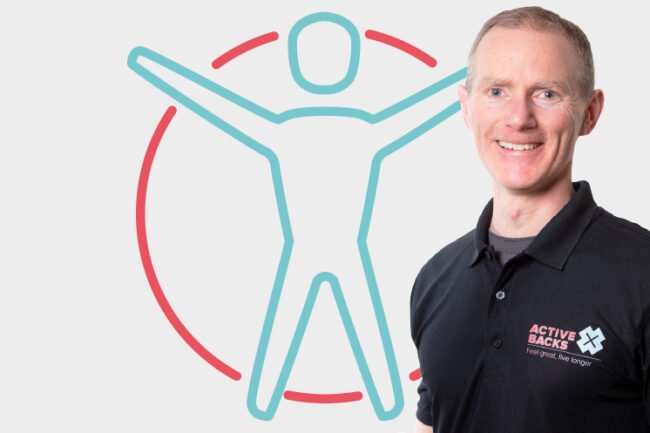What should I do when my lower back spasms?
What should I do when my lower back spasms?
Today’s episode is entitled “What should I do when my lower back spasms?” and it covers:
- Don’t panic when it spasms
- Avoid triggers of lower back spasms
- Find a comfy position, relax and breathe
- Use it or lose it, but don’t abuse it
- Put your pain in a bottle and use it as motivation to get a plan
By spasm we mean a sudden and intense gripping pain in the lower back that makes you drop to your knees or grab a hold of something to stay upright. It might be more on one side than the other or it might be all the way across. It’s this sort of spasm of pain that takes your breath away.

Don’t panic when it spasms
Panic will just make you tense and worsen your pain, so just relax.
Avoid triggers of lower back spasms
What are you doing when your back spasms? Are you stooping forward, reaching up, twisting to one direction, making the bed? Whatever it is you’re doing that triggers a sudden spasm of pain, avoid that activity it in the short term. We want you to return to normal activity levels, but in the short-term, avoid doing it. We’ll find another way of doing it later on.
Find a comfy position, relax and breathe
It’s important to reassure your nervous system that things are okay. If you keep ringing that alarm bell of pain, your nervous system will stay in a high state of alert. Try to go to the opposite end of the spectrum: relax and take nice, easy, deep breaths. As you breathe out, feel your lower back relaxing. If you’re into mindfulness or any form of meditation, do that. Focus on allowing your back to relax. The position could be lying flat on your back with a pillow under your knees, or curled up on your side. Whichever position is most comfortable for you.
While you’re there, think about what triggered your lower back pain. Most people with sudden onsets of lower back pain haven’t been involved in a major lifting incident or a car crash or any grief trauma. It’s almost always something innocuous like stooping over the car boot, brushing your teeth or sneezing. Those spasms of pain don’t indicate you’ve done any serious damage to your lower back. It’s just your nervous system’s only way of telling you there’s a problem. Your back got to a critical point and gave you a spasm of pain to warn you. If you carry on like this, you’re going to get more problems.
Use it or lose it, but don’t abuse it
Any movement you can do that doesn’t hurt is worth doing. You might still be lying flat on the floor, terrified to move, but don’t panic. Explore what movements you can do and do them. Don’t start with your lower back, instead pull your big toe up and down, rotating your ankle. Make a fist and then relax it. Tense your shoulders and relax them. Move, arrange your body. Movement without pain will reassure your nervous system that everything’s going to be okay. And the spasm will settle much faster as a consequence. If you’re still upright and you can walk without spasms of pain, do it. Walking is a nice, easy fluid motion.
Put your pain in a bottle and use it as motivation to get a plan
Think about your pain and put it in a bottle. That bottled pain is going to be your motivation to stick to a plan for relief and prevention. When you have sudden spasms of pain, your motivation to get better is super high, but when you get better you usually just revert to your old habits. This is because you forget about the pain. So bottle it. Every morning when you get up, take a sniff of that bottle to remind yourself how painful it can be. That way you will stick to a plan for relief and prevention. to avoid this from happening again.
If you want to start building that plan, you can get a free assessment at backpainandsciatica.com. The chat bot will tailor information for you. You’ll get a PDF email all about your lower back, the functional assessment. That’s the beginning of the process of building a plan for relief and prevention. Don’t just stop at relief, because it will happen again.


